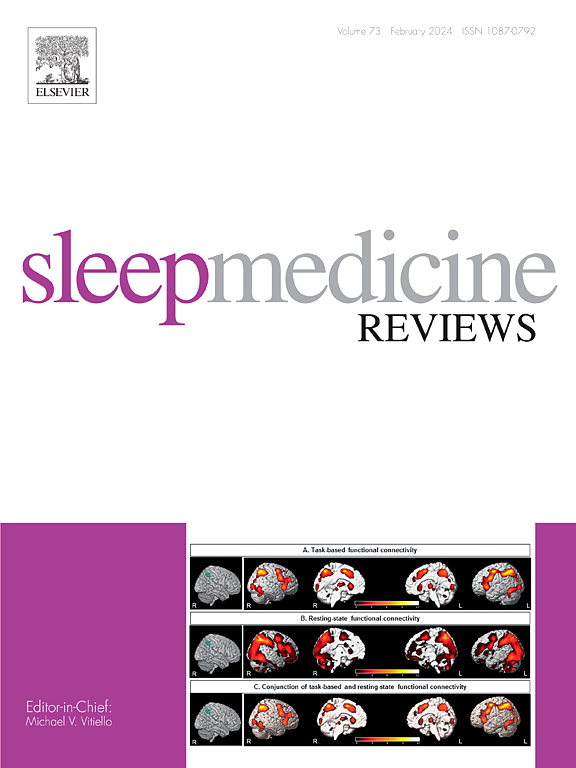阻塞性睡眠呼吸暂停和记忆障碍:临床特征、治疗策略和机制
IF 9.7
1区 医学
Q1 CLINICAL NEUROLOGY
引用次数: 0
摘要
阻塞性睡眠呼吸暂停(OSA)与心血管、代谢和神经系统功能障碍有关。然而,阻塞性睡眠呼吸暂停与记忆障碍、干预效果和潜在途径之间的关系尚不清楚。本文综述了osa引起的记忆障碍的临床特征、治疗策略和机制方面的最新进展。OSA患者可能表现出明显的记忆力下降,包括视觉和言语来源的工作记忆受损。asa相关的记忆障碍背后的潜在机制是复杂和多因素的,需要进一步的研究。神经炎症、氧化应激、神经元损伤、突触可塑性和血脑屏障功能障碍,这些在间歇性缺氧和睡眠中断下观察到的可能是导致学习和记忆功能障碍的原因。持续气道正压治疗可显著缓解OSA患者的记忆障碍。其他治疗方法正在出现,但需要对认知改善进行严格评估。临床上,可靠、客观的诊断工具是OSA患者认知功能障碍的准确诊断和临床表征所必需的。肠脑轴、表观遗传景观、遗传易感性和osa诱导的记忆损伤之间的复杂联系为研究提供了新的方向。临床表型集群的特征可以促进精准医学的进步,以预测和治疗osa相关的记忆缺陷。本文章由计算机程序翻译,如有差异,请以英文原文为准。
Obstructive sleep apnea and memory impairments: Clinical characterization, treatment strategies, and mechanisms
Obstructive sleep apnea (OSA), is associated with dysfunction in the cardiovascular, metabolic and neurological systems. However, the relationship between OSA and memory impairment, intervention effects, and underlying pathways are not well understood. This review summarizes recent advances in the clinical characterization, treatment strategies, and mechanisms of OSA-induced memory impairments. OSA patients may exhibit significant memory declines, including impairments in working memory from visual and verbal sources. The underlying mechanisms behind OSA-related memory impairment are complex and multifactorial with poorly understood aspects that require further investigation. Neuroinflammation, oxidative stress, neuronal damage, synaptic plasticity, and blood-brain barrier dysfunction, as observed under exposures to intermittent hypoxia and sleep fragmentation are likely contributors to learning and memory dysfunction. Continuous positive airway pressure treatment can provide remarkable relief from memory impairment in OSA patients. Other treatments are emerging but need to be rigorously evaluated for cognitive improvement. Clinically, reliable and objective diagnostic tools are necessary for accurate diagnosis and clinical characterization of cognitive impairments in OSA patients. The complex links between gut-brain axis, epigenetic landscape, genetic susceptibility, and OSA-induced memory impairments suggest new directions for research. Characterization of clinical phenotypic clusters can facilitate advances in precision medicine to predict and treat OSA-related memory deficits.
求助全文
通过发布文献求助,成功后即可免费获取论文全文。
去求助
来源期刊

Sleep Medicine Reviews
医学-临床神经学
CiteScore
20.10
自引率
3.80%
发文量
107
期刊介绍:
Sleep Medicine Reviews offers global coverage of sleep disorders, exploring their origins, diagnosis, treatment, and implications for related conditions at both individual and public health levels.
Articles comprehensively review clinical information from peer-reviewed journals across various disciplines in sleep medicine, encompassing pulmonology, psychiatry, psychology, physiology, otolaryngology, pediatrics, geriatrics, cardiology, dentistry, nursing, neurology, and general medicine.
The journal features narrative reviews, systematic reviews, and editorials addressing areas of controversy, debate, and future research within the field.
 求助内容:
求助内容: 应助结果提醒方式:
应助结果提醒方式:


